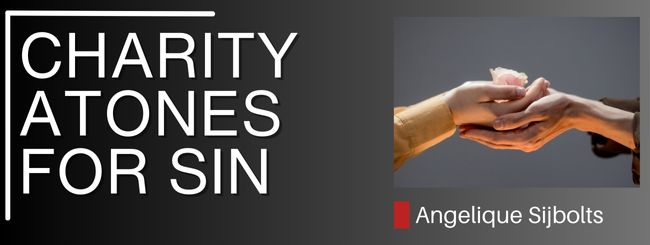בס”ד
Once, Rabban [our rabbi] Yohanan ben Zakkai, left Jerusalem, and Rabbi Yehoshua followed after him. And he saw the Holy Temple destroyed. [Rabbi Yehoshua said: Woe to us, for this is destroyed –] the place where all of Israel’s sins are forgiven! *I.e., via the bringing of sacrifices. [Rabbi Yohanan] said to him: My son, do not be distressed, for we have a form of atonement just like it. And what is it? Acts of kindness, as it says (Psalms 89:3), “For I desire kindness, not a well-being offering.”
Although charity also plays an important role in other religions, Judaism – see the texts below – teaches that charity is explicitly a means of wiping out sins, it is considered one of the most important acts that can undo a less favorable heavenly decision.
כִּ֛י חֶ֥סֶד חָפַ֖צְתִּי וְלֹא־זָ֑בַח וְדַ֥עַת אֱלֹקים מֵעֹלֽוֹת׃
For I desire goodness, not sacrifice;
Devotion to G-d, rather than burnt offerings.
לֹֽא־י֭וֹעִילוּ אוֹצְר֣וֹת רֶ֑שַׁע וּ֝צְדָקָ֗ה תַּצִּ֥יל מִמָּֽוֶת׃
Ill-gotten wealth is of no avail,
But righteousness saves from death.
לֹא־יוֹעִ֣יל ה֭וֹן בְּי֣וֹם עֶבְרָ֑ה וּ֝צְדָקָ֗ה תַּצִּ֥יל מִמָּֽוֶת׃
Wealth is of no avail on the day of wrath,
But righteousness saves from death.
בְּחֶ֣סֶד וֶ֭אֱמֶת יְכֻפַּ֣ר עָוֺ֑ן וּבְיִרְאַ֥ת ה’ ס֣וּר מֵרָֽע׃
Iniquity is expiated by loyalty and faithfulness,
And evil is avoided through fear of the L-rd.
עֲ֭שֹׂה צְדָקָ֣ה וּמִשְׁפָּ֑ט נִבְחָ֖ר לַה’ מִזָּֽבַח׃
To do what is right and just
Is more desired by the L-rd than sacrifice.
Just as the atonement afforded by the sacrifices was available to every Jew, so is the atonement afforded by chesed available to every Jew and non-Jew.
We see this form of atonement of sins even before there was a Tabernacle or Temple at all.
כִּ֣י תִשָּׂ֞א אֶת־רֹ֥אשׁ בְּנֵֽי־יִשְׂרָאֵל֮ לִפְקֻדֵיהֶם֒ וְנָ֨תְנ֜וּ אִ֣ישׁ כֹּ֧פֶר נַפְשׁ֛וֹ לַה’ בִּפְקֹ֣ד אֹתָ֑ם וְלֹא־יִהְיֶ֥ה בָהֶ֛ם נֶ֖גֶף בִּפְקֹ֥ד אֹתָֽם׃
When you take a census of the Israelite men according to their army enrollment, each shall pay Hashem a ransom for himself on being enrolled, that no plague may come upon them through their being enrolled.
זֶ֣ה ׀ יִתְּנ֗וּ כׇּל־הָעֹבֵר֙ עַל־הַפְּקֻדִ֔ים מַחֲצִ֥ית הַשֶּׁ֖קֶל בְּשֶׁ֣קֶל הַקֹּ֑דֶשׁ עֶשְׂרִ֤ים גֵּרָה֙ הַשֶּׁ֔קֶל מַחֲצִ֣ית הַשֶּׁ֔קֶל תְּרוּמָ֖ה לַֽה’׃
This is what everyone who is entered in the records shall pay: a half-shekel by the sanctuary weight—twenty gerahs to the shekel—a half-shekel as an offering to Hashem.
We see two words in the above text; Chesed חֶ֣סֶד and Tzedakah צְדָקָ֣ה.
1 Chessed, charity, implies that the recipient has no right to the gift and that the donor is under no obligation to give it. He gives it gratuitously, from the goodness of his heart. His act is a virtue rather than a duty.
Chesed is an attribute of G-d and with this attribute, G-d created the world. Psalm 89:2, refers to everything G-d gives to the world to exist, everything He gives to us to live. We can therefore see that Chesed is not just being “nice”, it involves all actions that support the other.
2 Tzedakah means righteousness or justice. The implication is that the donor gives because it is his duty. For, firstly, everything in the world belongs ultimately to G‑d. A man’s possessions are not his by right. Rather, they are entrusted to him by G‑d, and one of the conditions of that trust is that he should give to those who are in need[1].
The ways we can support others by chesed or tzedakah are:
We can give money, time, love, empathy, services, a listening ear, send an app, make a phone call, etc.
This can make the difference between life and death for us. The judgment passed on a person can be mitigated, not only for us but also for those to whom we give. We find this idea in the word ” מחצית ” – the half-shekel that the Jewish people had to give for their atonement.
The word “machatzit” (מחצית) — “a half” — has five letters, and the middle letter is a “צ”, the first letter of the word “tzedakah.” Flanking the “צ” there is a “ח” and a “י”, which spell the word “חי”— “life.” The exterior letters of the word are “מ” and “ת”, which mean death. Thus, the Torah is suggesting that “צ” — tzedakah — is the power that stands for the Jew [ and Non-Jews can learn from this the power of Tzedakah giving] and which can represent the difference between life and death. Tzedakah can distance death and bring life to those who practice it.[2]
Sometimes I hear people say, “This sounds like buying off sin”. This is not a correct interpretation. It is balancing. We see with many sins that they must be paid for. Think, for example, of a thief who must pay back the stolen object but also compensation, or someone who has caused injury to another.
Basically, every sin inflicts some form of injury on creation. That injury occurs because you take something away and you repair it by giving something back. Partly because you repair a sin, the sin itself is turned into something positive. This whole process of restoration creates reconciliation.
Let’s all give chesed and tzedaka, not only to atone for our sins but so we too make the world a better habitable place.
By Angelique Sijbolts
Sources:
[1] Chabad Article: Teshuvah, Tefilla and Tzedakah
[2] Dvar Torah Questions and Answers on Ki Tissa
Lets Get Biblical by Rabbi Tovia Singer, Volume 1 p. 79
Texts: Sefaria.org
Loving Kindness by Chofets Chaim – Artscroll Series p.170
